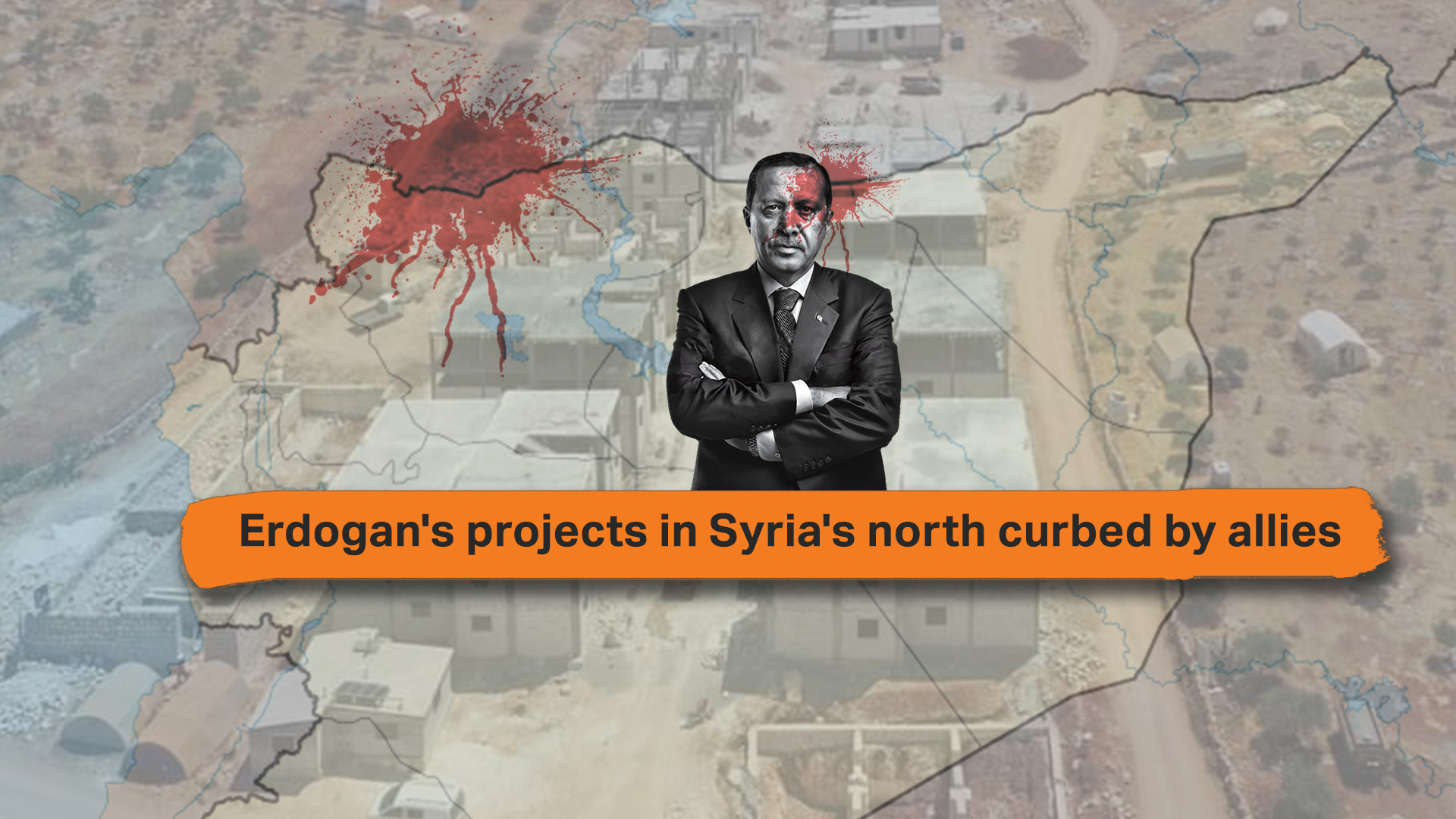Erdogan’s projects in Syria’s north curbed by allies
Erdogan's projects in Syria's north curbed by allies

Erdogan’s statements about the threat of launching a military operation on northern Syria under the pretext of establishing a “safe zone”, and occupying the border strip between Syria and Turkey to establish settlements for Syrian IDPs from other regions to impose a fait accompli within the framework of establishing a demographic change in the region subsided. It seems that this decline is due to the positions of the states allied to Turkey, due to the widening circle of rejection of this potential attack.
Despite the Ukrainian war and its global repercussions, Western sanctions on Russia, and continuing to arm the Ukrainian forces, it seems that the American and Russian position does not differ from the European position in rejecting any Turkish military operation on northern Syria because of its negative and catastrophic repercussions.
The US realizes that the Turkish plans have nothing to do with the voluntary return of Syrian refugees to their country, but rather to occupy the region, change its demography, and strike civil peace of its communities by targeting the Syrian Democratic Forces (SDF), which the US and the Western countries consider a close ally in the war against ISIS. So, any Turkish military attack on the region would threaten regional stability and the military campaign against ISIS.
The return of the US forces to Khirab Eshk military base in the south of Kobani, northern Syria, after they had previously evacuated it during the era of the former US president Donald Trump, constituted a clear message to the Turkish regime that it rejected any military attack on the entire east of the Euphrates.
During previous attacks, the Turkish regime and its terrorist factions, in coordination with Russia, were able to occupy hundreds of kilometers of land in northern Syria. These attacks were criticized by Turkey’s allies in NATO, especially the US. Some countries, including Sweden and Finland, which wish to join NATO, have also imposed an arms embargo on the Turkish regime. This explains why Ankara refuses joining the two countries in NATO.
As for the Russian position this time, it seems that it differs from the previous one, as the Russian envoy to Syria, Alexander Lavrentiev, declared that Russia considered Turkey’s potential military operation in Syria an “unwise” because it may cause an escalation of the situation and destabilization.” However, in conjunction with the Russian statements, there are files being negotiated between the two parties on reopening Turkish airspace for the movement of Russian aircraft and the Turkish position on Finland and Sweden joining NATO, as well as the transit of warships from the Bosphorus and Dardanelles straits.
In Syria, Moscow is trying to bring Erdogan down after his recent threats to attack northern Syria by persuading the Turkish regime to abandon the term “safe zone”, and replace it with the term “security belt”, that is, to replace the military attack with a political process that leads to the deployment of Syrian regime forces on the border under Russian cover in return for Ankara fulfilling its commitments regarding the Idlib issue.
Russia is trying to strengthen its positions at Ain Issa military base in Raqqa and at Qamishli International Airport. This step is a Russian message to Turkey that despite the understandings between the two states regarding the Ukrainian war and coordination regarding the Astana Peace Talks in Syria, Russia rejects any new Turkish military attack on northern Syria.
As for the European position, it comes within the framework of urging restraint regarding the potential Turkish military attack in northern Syria, in other words, resorting to diplomatic means rather than military. The European concern comes primarily from the revival of terrorist organizations in northern Syria, and that the conditions for the safe return of Syrian refugees have not yet been achieved. The European Union has so far maintained its policy of supporting refugees in the countries hosting them.
The international rejection of the potential Turkish military attack on northern Syria has made the Turkish regime realize that its plan to establish a “safe zone” in northern Syria will put it in direct confrontation with the US and Russia. It seems that the head of the Turkish regime is also aware that putting pressure on the European Union regarding the refugee issue and refusing to expand NATO to the north will not change the European Union’s position on the inability to accept Turkey as a member of the Union.
Based on the foregoing, Turkey’s foreign policy is a reflection of its domestic policy. Opinion polls indicate a significant decline in the popularity of the Turkish President Recep Tayyip Erdogan and his ruling party in the upcoming elections. The head of the Turkish regime has so far failed to find solutions to the country’s tense economic and monetary policy.
Erdogan, who is going through a crisis both internally and externally, is looking forward by choosing the path of fighting the fighters of the Kurdistan Workers’ Party (PKK) and threatening a military attack on northern Syria as a means to achieve political and national goals before the upcoming elections.
So, there are several challenges that impede the Turkish military attack on the region, including that the plan needs years, not months, to be implemented, and it has not received regional or international approval so far, and the Autonomous Administration of North and East Syria (AANES) exists on the ground and rejects this plan.
In addition, the positions of the refugees themselves, where some of whom may not accept moving to these areas that witness insecurity, as well as the position of the original inhabitants of those areas who refuse to settle other residents in their own areas. In case the plan is implemented, how will the economic resources in the region be managed since it is already suffering from stifling living crises?




